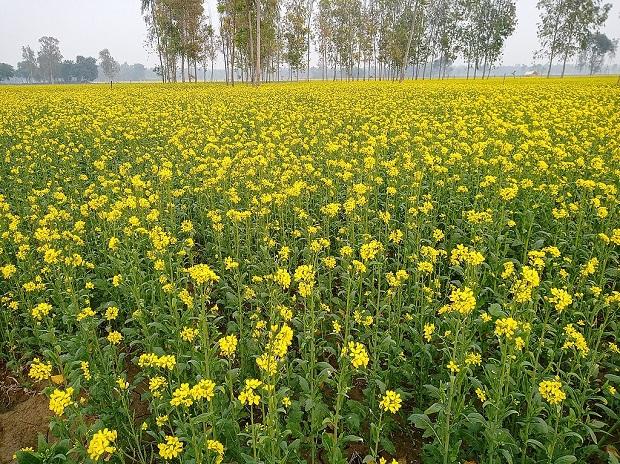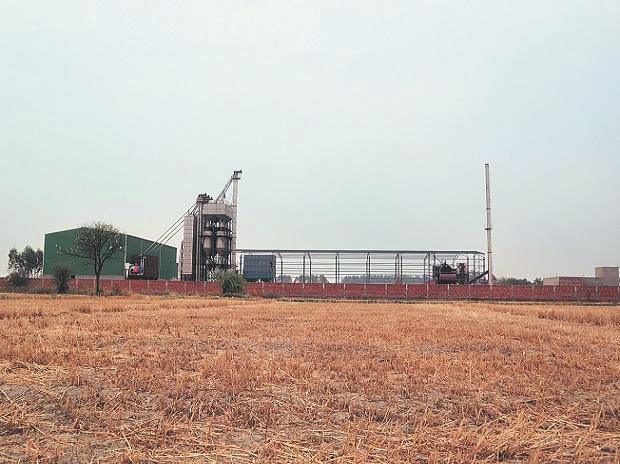The environment ministry’s Genetic Engineering Appraisal Committee (GEAC) has recommended the environment release of genetically modified (GM) mustard hybrid DMH-11: the first crop to get such a tag since Bt cotton years ago, according to some scientists.
This paves the way for the commercial release of GM mustard, and it is now up to gene developers to grant permission for commercial release. States, too have the power to deny final commercial approval.
“To generate scientific evidences in Indian agro-climatic situation and also as a precautionary mechanism, the field demonstration studies with respect to the effect of GE (genetically engineered) mustard on honey bees and other pollinators, as recommended in the GEAC meeting, shall also be conducted post environmental release, simultaneously by the applicant, within two years under supervision of ICAR, as per ICAR (Indian Council of Agriculture Research) guidelines and a report be submitted to the GEAC,” the committee said in the minutes of its meeting held on October 18 and uploaded on its website on Wednesday.
Patents on GM mustard are jointly owned by India’s National Dairy Development Board (NDDB) and the University of Delhi under Prof Deepak Pental.
Between 2002 and now, the GEAC, which was previously known as Genetic Engineering Approval Committee, had approved Bt Brinjal, but the commercial release was stayed by the then environment minister on the grounds of insufficient scientific evidence about safety.
Experts said whether the GEAC clearance this time paves the way for the final commercial release of GM mustard is unclear because, as per protocol, the minutes of the committee’s meeting are uploaded after all clearances have been obtained.
“Whether this time, the same protocol applies or the approval will once again need to go through the table of the minister remains to be seen,” said a senior scientist.
The GEAC said on the website that the recommendation to release GM mustard is for four years from the date of issue of the approval letter.
The development of the hybrid and its post-release monitoring will be done by a team of senior subject matter and external experts, as per the GEAC order.
“Commercial use of DMH-11 hybrid shall be subject to Seed Act 1966 and related rules and regulations, its amendments and Gazette notifications from time to time as applicable,” GEAC said in its minutes.
“Commercial use of GM mustard hybrid DMH-11 and its parental lines bn 3.6 carrying barnase and bar genes, and modbs 2.99 containing barstar and bar genes will be used for developing new parental lines and hybrids under supervision of Indian Council of Agricultural Research (ICAR) that will allow Indian mustard farmers to produce more mustard per unit area,” said Bhagirath Choudhary, Founder Director of the South Asia Biotechnology Centre (SABC) in a Facebook post.
He said that the technology for GM mustard would accelerate breeding programmes by both the public and private sectors resulting in the introduction of high-yielding and superior hybrids capable of revolutionising mustard farming and edible oil production in the country.
Mustard is cultivated in the country on around 6.5-7.0 million hectares of land by around 6 million farmers in Rajasthan, Haryana, Punjab and Madhya Pradesh.
Mustard matters
However, the per hectare yield of Indian mustard is very low at 1-1.2 tonnes per hectare. The global average is more than double this at 2.3-3 tonnes per hectare.
“Low mustard production and yield is characterised by a narrow variability in Indian mustard germplasm, lack of hybridisation of mustard and infestation of biotic and abiotic stresses. Severe weed infestation after 30-45 days makes it difficult for manual weeding and nearly 30 per cent losses are due to weeds alone,” Choudhury said.
The new GM mustard hybrid promises to address several of these concerns.
A few weeks back, the regulatory authority in Australia approved the commercial cultivation of genetically modified Indian mustard species called ‘Brassica juncea’ for herbicide tolerance.
Scientists said this is perhaps the first anywhere in the world that any genetically modified variety of Indian mustard has been recommended for commercial approval.
“What has happened is shocking in its lack of scientificity or responsible regulation. Nothing has changed from 2017 when GEAC gave its approval to GM mustard commercial cultivation, when the regulator gave a green signal but the decision was not cleared by the ‘competent authority’ that is the minister or ministry of environment, forest and climate change’. Only two additional tests have been prescribed by GEAC in a perfunctory and irresponsible fashion since then as though the debate about GM mustard was about these two aspects alone. What is worse, the crop developer did not do these studies and pleaded with the regulators against such studies. GM mustard got to this stage in the first instance by the regulatory body colluding with the crop developer in circumventing biosafety assessment in numerous ways,” the Coalition for GM-free India said in a statement.
It said that the “so-called expert committee” set up by the government in August 2022, under whose recommendations the GEAC nod has come, is headed by a scientist from the Department of Biotechnology (DBT), which in itself is an objectionable conflict of interest, given that DBT is the founder of GM mustard.
“Ignoring numerous serious concerns around GM mustard, this Expert Committee gave the excuse that GEAC needed to approve GM mustard. This compromises biosafety in serious and objectionable ways, and we ask the Government of India not to move forward in allowing this dangerous herbicide-tolerant food crop in India”, the coalition said in the statement.
Meanwhile, RSS-affiliate Swadeshi Jagran Manch (SJM) also said that they are hopeful that the competent authority for final approval (which in this case is the minister of environment and forest) won’t give the final nod.
“This GM mustard variety is not swadeshi as was claimed in 2017 (when the first GEAC nod came), nor is it safe. The facts that were there in 2017 haven’t changed a bit . This GM mustard is extremely dangerous to public health and also that of the farmers growing them. And, therefore, we in SJM will continue to oppose it. And, we also urge the government to not fall into such a trap and give heed to such recommendations of the GEAC,” Ashwini Mahajan, co-convenor of Swadeshi Jagran Manch (SJM), told Business Standard.
“As per our understanding no final decision has been made and we sincerely hope that no decision is taken on this,” Mahajan said.
The Federation of Seed Industry of India (FSII) welcomed the environmental release of GM mustard. “This includes genetically engineered mustard parental lines that can be used for developing new parental lines, hybrids and the hybrid DMH-11 for seed production and testing. The technology would enable us to efficiently breed better hybrids for mustard for increased yields and resistance to diseases. Developing improved varieties of oilseeds with higher yields, better climate resilience and resistance to disease and pests is the first step towards improving productivity and lowering oil imports. This is the first edible GM crop that has been approved in India and the second crop after Bt cotton. We hope this approval ushers an era of technology use in seed improvement and agriculture,” said Shivendra Bajaj, Executive Director, FSII.
Note:- (Not all news on the site expresses the point of view of the site, but we transmit this news automatically and translate it through programmatic technology on the site and not from a human editor. The content is auto-generated from a syndicated feed.))




Hi there, this weekend is fastidious in support of me, since
this occasion i am reading this fantastic informative paragraph here at
my house.